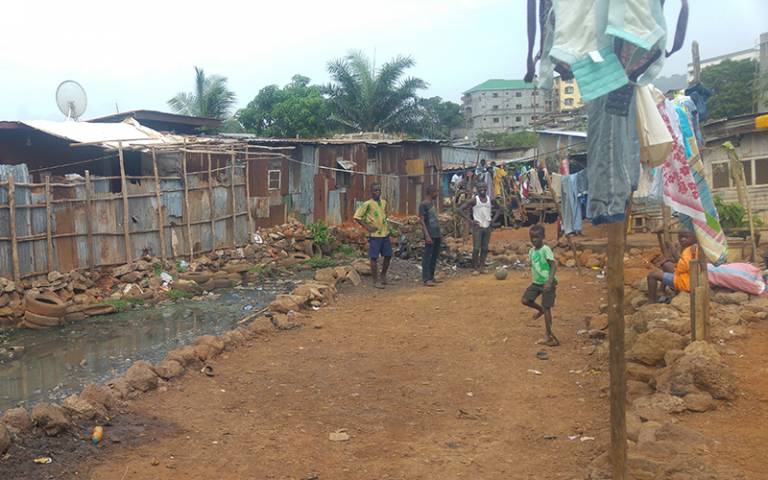Urbanisation and health in the 21st century: A Southern perspective
12 November 2018

A child plays next to an open sewer in Freetown, Sierra Leone. Unhealthy living conditions are an everyday reality for one in seven of the world’s population who live in informal settlements like this. What does this say about the relationship between urbanisation and health in the twenty-first century?
The MSc in Health in Urban Development (HUD) comes at a critical moment. The world’s population is now more than 50% urban, and by 2050, two-thirds will be urban dwellers. Most of this growth is set to occur in the global South, where Asia and Africa are the least urbanised and most rapidly urbanising continents. This shift is unprecedented, with serious consequences for urban health. Here’s why.
Urbanising countries are going through a set of interconnected transitions: a demographic transition from rural to urban living; an economic transition from agriculture to non-farm activities; and an environmental transition from traditional to modern health risks. This latter transition is generally associated with a shift away from communicable diseases and injuries linked to industrial development and urbanisation, toward a gradual upturn in non-communicable diseases linked to outdoor air pollution and unhealthy lifestyles.
For countries at the beginning of their urban transitions, infectious and parasitic diseases (malaria, diarrhoea, respiratory illnesses) and injuries (from road traffic accidents, occupational hazards, fires) typically account for most of ill-health, death and disability. But the burden of poor health is not equally distributed socially and spatially. Inequalities between high- and low-income groups are closely related to health inequities, reflecting an ‘urban poverty penalty’ linked to poor quality living environments, especially in informal settlements.
This is why the programme positions ‘health in urban development’ – it enables health disparities to be seen as a product of urban development and the institutions (governance) that shape it. This view makes the connections between development planning and public health in order to address the social determinants of health in the physical environment (land, infrastructure, buildings), natural environment (soil, water, air) and the social (community) environment at multiple scales (individual, household, city-wide, national and international). In doing so, the programme tackles several key questions:
- How (and why) does the urban, as both a political and a spatial entity, produce and reproduce disparities in health outcomes?
- What are the epistemological and ideological foundations that shape intervention strategies in order to create significant institutional and disciplinary transformations in the field of urban health?
- What are the synergies between development planning and public health and how do both disciplines contribute to health equity in urban settings?
- What is the role of different agents (international, national, urban and community-based) in promoting urban-health justice?
- Under what conditions can healthy cities be planned, managed and designed for all people in the global South?
The HUD programme draws on the extensive experience of diverse Faculty at the DPU and across UCL to tackle these questions from interdisciplinary and critical perspectives, ranging from urban planning, architecture and engineering, to public health and epidemiology, to disaster risk reduction and climate change adaptation. Key themes include poverty and inequality, informality, infrastructure, homelessness, urbanisation, the environment, and social justice.
The DPU is particularly well placed to address these issues given its longstanding focus on real-world problems and rich tradition of problem-based learning in the global South. In blurring the lines between research and practice, the programme will equip students with the academic and professional skills both to measure and analyse urban health problems and to design progressive solutions based on urban theory and conceptual thinking. Few post-graduate programmes focused on human health engage with urban areas in general and the global South in particular, positioning the HUD programme at the forefront of education and research in this increasingly important area.
View the MSc Health in Urban Development programe page for more information and applications
 Close
Close

